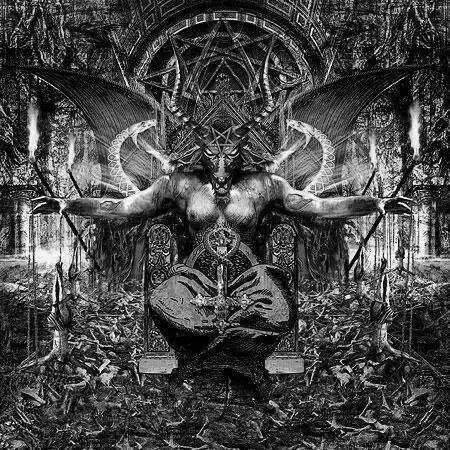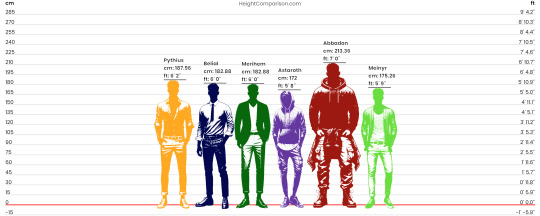#[Pythius -appearance-]
Explore tagged Tumblr posts
Text


Fisette and Kadios-- two of the Elder Pack Leaders of the Aifaen.
Pythius, one of the ruling members of the Vash-Aifaen, and his personal knight, Melchior.




Eleare and Darrow-- two of the regular pack leaders of the Aifaen.
#[Fisette -appearance-]#[Kadios -appearance-]#[Pythius -appearance-]#[Io -appearance-]#[Eleare -appearance-]#[Darrow -appearance-]#[royalty verse]#I ended up just going with 6 of them because...well because I said so.#Those are probably Morgan's hands in the Kade image let's be honest alskfdna#nobody else is touching that man without going through her#but also watch his image is the one that's gonna get this post nuked
16 notes
·
View notes
Text

The Seven Princes of Hell weren’t just demons, and it didn’t take a genius to come to that conclusion; merely being in their presence was an unspoken explanation all of its own. They were some of the oldest, wisest, most respected hellspawns known to mankind, and they had all been hand-chosen by Lucifer himself to become a part of his board of directors. Simply being in their proximity was enough to render even the most astute devil absolutely witless.
Belphegor, the Prince of Vanity. Mammon, the Prince of Greed. Beezlebub, the Prince of Indolence. Astaroth, the Prince of Wrath. Leviathan, the Prince of Envy. Asmodeus, the Prince of Lust. Pythius, the Prince of Despair.
These seven royals represented some of humanity’s most damning sins— traits that, when left unattended and recklessly ignored, could cause the downfall of empires, societies, entire countries, and the deaths of thousands of innocent people at the hands of violence and man’s timeless hunger for power. They radiated an aura so ancient and powerful, it could be felt down to one’s weary, exhausted bones. It was terrifying and all-consuming, suffocating every inhale and threatening to vanquish it with the flick of a wrist. It was electrifying and untamable, vibrating through each bodily atom and making it feel as if your very essence was at the risk of being dissolved out of existence. It was ravenous and unyielding, giving away that it had been festering long before civilizations ever formed, and that it would continue to persevere long after nations faded away to ash.
The princes were a force not many reckoned with, and whatever moronic soul dared to challenge that fact did not live to tell the tale. Ascending to such a respected, sophisticated rank is an occurrence so rare, the last candidate had been chosen over a millennia ago, and though many have been nominated for the title since, none had managed to meet Lucifer’s scrutinizing standards. The king of Hell was extremely selective when it came to those he kept closest to his throne, and no one can blame the archangel for that tendency; unwavering loyalty and resistance to temptation are scarce commodities.
Alongside having to exceed all of Satan’s expectations, a demon was expected to surpass all of their brethren in training to even be considered worthy of the royal crest. They must be ruthless and graceful in combat, never forfeiting to an opponent even when outmatched, and depicting confident resilience no matter how dire the circumstances may seem. They must be an expert in occult practice, with narrow precision during performance, complete mastery of the Latin language, no limits on how far they’re willing to push their powers, and a willingness to perform even the most challenging dark magic at a moment’s notice. They must be a patient, intelligent, perspective, calculating strategist, with no room for mistakes and no time to waste. In other words, a potential candidate must be the ideal demon in every way imaginable, which is why so few have ever passed the mark.
Henceforth, history has only ever seen seven princes of Hell, and that number was theorized to remain stagnant both for the foreseeable and distant future. It appeared that demons just weren’t the same breed of legendary perfection they used to be, and Lucifer wasn’t known for lowering his criteria for anyone. If no one is of caliber for the position, then it would remain empty for as long as he deems fit. Hell’s reputation isn’t worth the gamble.
That is, until one unsuspecting applicant came along and changed the entire narrative. He not only met every standard, but set new ones. He not only mastered lethal combat, but developed his own personal techniques. He not only became an expert in satanic magic, but began creating his own spells by memorizing grimoires and merging all of his knowledge. He climbed to the top of his brigade, and even managed to best some of his teachers. He devoted his soul to his stature, made a name for himself despite his youth, caught Lucifer’s attention for the first time in almost a thousand years, and by some miracle, managed to keep it.
The newest member of the Summis Conilio— the Superior Council— and therefore the eighth prince of Hell: Ramiel, the Prince of Chaos.
#demon!harry#i want him 👹#i finagled some of the demonology in this cause ‘the Prince of sloth’ just sounds dumb and gluttony is similar to greed AKDKANSNSN
72 notes
·
View notes
Text

“Well. Hopefully that pissed him off enough to at least get us somewhere. Drawn out negotiations are the worst...” A sigh, and a roll of his eyes before his steps are interrupted by his phone floating from his pocket with the trill of a call. A familiar blonde appearing via hologram from the screen once answered. “Mm...? Oh, Mei~ Just in time; I finished negotiations with your uncle and brother not long ago. How are you feeling? Any better?”

“I’m fine, it was a fluke...I’m already back on my feet and everything. And yeah, I heard...~ I just got a call saying that you’re being an asshole. You’re lucky Pythius didn’t snap and beat you half to deal. Or fully to death. Seriously, can’t you behave for anyone aside from me?”

“I could. But that wouldn’t get me anywhere, now would it? Besides, they’re trying to short-change me...at least with you, the offers are tempting off the bat, so things are over quick. Speaking of, if you’re back on your feet, then when are you coming over here?”

“Isn’t it supposed to be your turn to come see me, this time? Tell you what, I’ll talk to my family, and see what I can do...and then once the negotiations are done, you can call me back and we can figure out a time to get you and Jaey out here to visit for a while. Sound good?”

“Sounds like you’re trying to swindle me too...~”
“But is it working~?”
“I know you’ll come out here if I hold out long enough.”
“Come on, Tari, don’t try to make me beg...”

“Why not? It’d be a good look for you, I bet.”

“Maybe, maybe not~” A laugh, and Mei shakes his head before offering a mischievous grin. “I’ll call you later, okay? Like I said, I’ll talk to my family, so quit instigating and make a deal.”

“Mhm, I got it...but I’ll be bored out of my mind the whole time, so I hope you’re happy.”

“Oh. So happy. You just made my day, truly. I’ll be singing your praises--”
“Smartass. I’ll talk to you later, Mei. Vre'la blitti.”
“Thanks. You too, Tari.”
#~Side Muse: Tarinx Esvll~#~Don't Let Your Mind Wander too Far MEI~#(since apparently hover text isn't wanting to work anymore#vre'la blitti means 'Be well' in Irekoli)
4 notes
·
View notes
Text
The Demonic Pantheon Worked With Within This Book
TEXT 4 OF HELL’S DICTATE
Here we examine the Demonic Pantheon of Hell Worked within the Practices of Hell’s Dictate. Each Demon is given with their recognized Title of empowerment, throughout this Book Evocations for each of these Grand Infernal Spirits shall be given and within those Texts a full listing of the areas of power over which the specific Infernal Being holds power shall be put forth along with descriptions of their manifested appearance. Some Demons familiar to others may be missing from this list and this is because from Communions with Our Lord Satan and the Demon Beelzebub I have been informed conclusively that while there are Demons who are Fallen Angels there are others who are not and have always been ancient forces of Darkness. The Demons listed here are and always have been Demonic entities and never were Angels despite what is written in other Books or claimed by the Church of Lies. These deceptions have been instigated by the Orthodox Church to ensure that their lies regarding their God having infinite power over all is believed, a perfect deception for if God created all he must have power over all . . . not so, the Demons here are primal forces of unhallowed Darkness far older than the God of the Abrahamic Faiths.
Satan ~ Lord Of Hell Lilith ~ Lady Of Hell Beelzebub ~ Standard Bearer Of Hell Abaddon ~ Lord Of The Isolate Pit Asmodeus ~ Lord Of The Carnal House Naamah ~ Demon Of Seduction Lucifuge Rofocale ~ Grand Paymaster Of Hell Rimmon ~ Grand Physician Of Hell Belphegor ~ Demon Of Inventions Arioch ~ Demon Of Vengeance Adramalech ~ Demon Of Plague Alastor ~ The Grand Executioner Of Hell Sirchade ~ Guardian Demon Of Wildlife Mephistopheles ~ Master Of Pacts Frucissiere ~ Demon Of The Dead Eurynomous ~ Demon Of Torment Sonneillon ~ Demon Of Discord Sargatanas ~ The Guardian Demon Vetis ~ Tempter Of The Holy Hiepacth ~ Lord Of The Lost Verdelet ~ Master Of Ceremonies Agaliarept ~ Guardian Of The Gate Frimost ~ The Grand Seducer Eisheth Zenunim ~ The Queen Of Harlots Jezebeth ~ Mistress Of Deceit Agrat Bat Mahlat ~ Demon Of Adultery Agramon ~ Demon Of Fear Sergulath ~ Grand Divider Of Alliances Rosier ~ Grand Demon Of Love Surgat ~ Grand Demon Of Keys Huictiigara ~ Demon Of Sleep Khil ~ Grand Demon Of Disaster Aglasis ~ Demon Of Transport Philotanus ~ Grand Demon Of Learning Musisin ~ Grand Demon Of Command Ancitif ~ Demon Of Possession Elelogap ~ Demon Princess Of The Seas Xaphan ~ Demon Prince Of Fire Stygal ~ Grand Demon Of Death Rahovart ~ Demon Of Immorality Unsere ~ Grand Demon Of Motherhood Cressil ~ Demon Prince Of Indulgence Picollus ~ Infernal Speaker With The Dead Clauneck ~ Demon Of Riches Clistheret ~ Demon Of Illusions Guland ~ Demon Of Disease Proculo ~ Demon Of The Realms Of Sleep Pythius ~ Lord Of Deception Klephoth ~ Demon Of Prophetic Dreams Ukobach ~ Demon Of Pyromancy Mersilde ~ Demon Of The Astral Realms Segal ~ Demon Of Apparitions Bechard ~ Lord Of Lightning Ribesal ~ Demon Of Storms Bucon ~ Demon Of Hatred Morail ~ Demon Of Concealment Humots ~ Grand Demon Of Transport Delepitorae ~ Demon Of Enchantment Verrier ~ Demon Of Healing Arphaxat ~ Possessor Of The Holy
(c)Tanath 2019

Depicted Image’s Origin Not Known
#hells dictate#demonology#demonic pantheon#satan king of hell#demons#lilith queen of hell#beelzebub#abaddon#infernal spirits#titles of power
298 notes
·
View notes
Text
Day 7 of 30 Days of Apollon
Names and epithets
He has so many, though my favourite has to be ‘Lykios’ meaning ‘of the wolves’ or ‘Horios’ meaning ‘Boundaries, Of Borders’

More of his epithets are below
ABAEUS (Abaios), a surname of Apollo derived from the town of Abae in Phocis, where the god had a rich temple. (Hesych. s. v. Abai; Herod. viii. 33; Paus. x. 35. § 1, &c.)
ACERSE′COMES (Akersekomês), a surname of Apollo expressive of his beautiful hair which was never cut or shorn. (Hom. Il. xx. 39; Pind. Pyth. iii. 26.)
ACE′SIUS (Akesios), a surname of Apollo, under which he was worshipped in Elis, where he had a splendid temple in the agora. This surname, which has the same meaning as akestôr and alexikakos, characterised the god as the averter of evil. (Paus. vi. 24. § 5.)
ACESTOR (Akestôr). A surname of Apollo which characterises him as the god of the healing art, or in general as the averter of evil, like akesios. (Eurip. Androm. 901.)
ACTIACUS, a surname of Apollo, derived from Actium, one of the principal places of his worship. (Ov. Met. xiii. 715; Strab. x. p. 451; compare Burmann, ad Propert. p. 434.)
AEGLE′TES (Aiglêtês), that is, the radiant god, a surname of Apollo. (Apollon. Rhod. iv. 1730; Apollod. i. 9. § 26; Hesych. s. v.)
AGE′TOR (Agêtôr), a surname given to several gods, for instance, to Zeus at Lacedaemon (Stob. Serm. 42): the name seems to describe Zeus as the leader and ruler of men; but others think, that it is synonymous with Agamemnon :-- to Apollo (Eurip. Med. 426) where however Elmsley and others prefer halêtôr :-- to Hermes, who conducts the souls of men to the lower world. Under this name Hermes had a statue at Megalopolis. (Paus. viii. 3. § 4.)
AGO′NIUS (Agônios), a surname or epithet of several gods. Aeschylus (Agam. 513) and Sophocles (Trach. 26) use it of Apollo and Zeus, and apparently in the sense of helpers in struggles and contests. (Comp. Eustath. ad Il. p. 1335.) But Agonius is more especially used as a surname of Hermes, who presides over all kinds of solemn contests. (Agônes, Paus. v. 14. § 7; Pind. Olymp. vi. 133, with the Schol.)
AGRAEUS (Agraios), the hunter, a surname of Apollo. After he had killed the lion of Cithaeron, a temple was erected to him by Alcathous at Megara under the name of Apollo Agraeus. (Paus. i. 41. § 4; Eustath. ad Il. p. 361.)
AGYIEUS (Aguieus), a surname of Apollo describing him as the protector of the streets and public places. As such he was worshipped at Acharnae (Paus. i. 31. § 3), Mycenae (ii. 19. § 7), and at Tegea. (viii. 53. § 1.) The origin of the worship of Apollo Agyieus in the last of these places is related by Pausanias. (Compare Hor. Carm. iv. 6. 28; Macrob. Sat. i. 9.)
ALEXI′CACUS (Alexikakos), the averter of evil, is a surname given by the Greeks to several deities, as -- Zeus (Orph. De Lapid. Prooem. i.), -- to Apollo, who was worshipped under this name by the Athenians, because he was believed to have stopped the plague which raged at Athens in the time of the Peloponnesian war (Paus. i. 3. § 3, viii. 41. § 5), -- and to Heracles. (Lactant. v. 3.)
AMAZO′NIUS (Amazonios), a surname of Apollo, under which he was worshipped, and had a temple at Pyrrhichus in Laconia. The name was derived either from the belief that the Amazons had penetrated into Peloponnesus as far as Pyrrhichus, or that they had founded the temple there. (Paus. iii. 25. § 2.)
AMYCLAEUS (Amuklaios), a surname of Apollo, derived from the town of Amyclae in Laconia, where he had a celebrated sanctuary. His colossal statue there is estimated by Pausanias (iii. 19. § 2) at thirty cubits in height. It appears to have been very ancient, for with the exception of the head, hands, and feet, the whole resembled more a brazen pillar than a statue. This figure of the god wore a helmet, and in his hands he held a spear and a bow. The women of Amyclae made every year a new chitôn for the god, and the place where they made it was also called the Chiton. (Paus. iii. 16. § 2.) The sanctuary of Apollo contained the throne of Amyclae, a work of Bathycles of Magnesia, which Pausanias saw. (iii. 18. § 6, &c.; comp. Welcker, Zeitschrift für Gesch. der alt. Kunst. i. 2, p. 280, &c.)
ARCHE′GETES (Archêgetês). A surname of Apollo, under which he was worshipped in several places, as at Naxos in Sicily (Thuc. vi. 3; Pind. Pyth. v.80), and at Megara. (Paus. i. 42. § 5.) The name has reference either to Apollo as the leader and protector of colonies, or as the founder of towns in general, in which case the import of the name is niearly the same as theos patroôs.
BOEDRO′MIUS (Boêdromios), the helper in distress, a surname of Apollo at Athens, the origin of which is explained in different ways. According to some, the god was thus called because he had assisted the Athenians in the war with the Amazons, who were defeated on the seventh of Boëdromion, the day on which the Boëdromia were afterwards celebrated. (Plut. Thes. 27.) According to others, the name arose from the circumstance, that in the war of Erechtheus and Ion against Eumolpus, Apollo had advised the Athenians to rush upon the enemy with a war-shout (Boê), if they would conquer. (Harpocrat., Suid., Etym. M. s.v. Boêdromios; Callim. Hymn.in Apoll. 69.)
CARNEIUS (Karneios), a surname of Apollo under which he was worshipped in various parts of Greece, especially in Peloponnesus, as at Sparta and Sicyon, and also in Thera, Cyrene, and Magna Graecia. (Paus. iii. 13. § 2, &c., ii. 10. § 2, 11. § 2; Pind. Pyth. v. 106; Plut. Sympos. viii. 1; Paus. iii. 24. § 5, iv. 31. § 1, 33. § 5.) The origin of the name is explained in different ways. Some derived it from Carnus, an Acarnanian soothsayer, whose murder by Hippotes provoked Apollo to send a plague into the army of Ilippotes while he was on his march to Peloponnesus. Apollo was afterwards propitiated by the introduction of the worship of Apollo Carneius. (Paus. iii. 13. § 3; Schol. ad Theocrit. v. 83.) Others believed that Apollo was thus called from his favourite Carnus or Carneius, a son of Zeus and Europa, whom Leto and Apollo had brought up. (Paus. l. c. ; Hesych. s. v. Karneios.) Several other attempts to explain the name are given in Pausanias and the Scholiast on Theocritus. It is evident, however, that the worship of the Carneian Apollo was very ancient, and was probably established in Peloponnesus even before the Dorian conquest. Respecting the festival of the Carneia see Dict. of Ant. s. v. Karneia.
CATAE′BATES ( Kataibatês), occurs as a surname of several gods . . . Of Apollo, who was invoked by this name to grant a happy return home (katabasis) to those who were travelling abroad. (Eurip. Bacch. 1358; Schol. ad Eurip. Phoen. 1416.)
CHRYSAOR (Chrusaôr). The god with the golden sword or arms. In this sense it is used as a surname or attribute of several divinities, such as Apollo (Hom. II. xv. 256), Artemis (Herod. viii. 77), and Demeter. (Hom. Hymn. in Cer. 4.)
CLA′RIUS (Klarios), a surname of Apollo, derived from his celebrated temple at Claros in Asia Minor, which had been founded by Manto, the daughter of Teiresias, who, after the conquest of her native city of Thebes, was made over to the Delphic god, and was then sent into the country, where subsequently Colophon was built by the Ionians. (Paus. vii. 3. § 1, ix. 33. § 1; Tacit. Ann. ii. 54; Strab. xiv. p. 642; Virg. Aen. iii. 360; comp. Muller, Dor. ii. 2. § 7.) Clarius also occurs as a surname of Zeus, describing him as the god who distributes things by lot (klaros or klêros, Aeschyl. Suppl. 360). A hill near Tegea was sacred to Zeus under this name. (Paus. viii. 53. § 4.)
CO′RYDUS (Korudos), a surname of Apollo, under which the god had a temple eighty stadia from Corone, on the sea-coast. (Paus. iv. 34. § 4, &c.)
CY′NTHIUS and CY′NTHIA (Kunthia and Kunthios, surnames respectively of Artemis and Apollo, which they derived from mount Cynthus in the island of Delos, their birthplace. (Callim. Hymn. in Del. 10; Hor. Carm. i. 21. 2, iii. 28. 12; Lucan, i. 218.)
DAPHNAEUS and DAPHNAEA (Daphnaia and Daphnaios), surnames of Artemis and Apollo respectively, derived from daphnê, a laurel, which was sacred to Apollo. In the case of Artemis it is uncertain why she bore that surname, and it was perhaps merely an allusion to her statue being made of laurel-wood (Paus. iii. 24. § 6; Strab. xvi. p. 750; Philostr. Vit. Apollon. i. 16; Eutrop. vi. 11; Justin. xv. 4.)
DECATE′PHORUS (Dekatêphoros), that is, the god to whom the tenth part of the booty is dedicated, was a surname of Apollo at Megara. Pausanias (i. 42. § 5) remarks, that the statues of Apollo Pythius and Decatephorus at Megara resembled Egyptian sculptures.
DE′LIUS and DE′LIA (Dêlios and Dêlia or Dêlias), surnames of Apollo and Artemis respectively, which are derived from the island of Delos the birthplace of those two divinities. (Virg. Aen. vi. 12, Eclog. vii. 29; Val. Flacc. i. 446; Orph. Hymn. 33. 8.) They are likewise applied, especially in the plural, to other divinities that were worshipped in Delos, viz. Demeter, Aphrodite, and the nymphs. (Aristoph. Thesm. 333; Callim. Hymn. in Dian. 169, Hymn. in Del. 323; Hom. Hymn. in Apoll. Del. 157.)
[DELPHINIUS and] DELPHI′NIA (Delphinia), a surname of Artemis at Athens. (Pollux, x. 119.) The masculine form Delphinius is used as a surname of Apollo, and is derived either from his slaying the dragon Delphine or Delphyne (usually called Python) who guarded the oracle at Pytho, or front his having shewn the Cretan colonists the way to Delphi, while riding on a dolphin or metamorphosing himself into a dolphin. (Tzetz. ad Lycoph. 208.) Under this name Apollo had temples at Athens, Cnossus in Crete, Didyma, and Massilia. (Paus. i. 19. § 1; Plut. Tiles. 14; Strab. iv. p. 179; Müller, Aeginet. p. 154.)
EPACTAEUS or EPA′CTIUS (Epaktaios or Epaktios), that is, the god worshipped on the coast, was used as a surname of Poseidon in Samos (Hesych. s. v.), and of Apollo. (Orph. Argon. 1296; Apollon. Rhod. i. 404.)
EPIBATE′RIUS (Epibatêrios), the god who conducts men on board a ship, a surname of Apollo, under which Diomedes on his return from Troy built him a temple at Troezene. (Paus. ii. 32. § 1.) In the same sense Apollo bore the surname of Embasios. (Apollon. Rhod. i. 404.)
EPICU′RIUS (Epikourios), the helper, a surname of Apollo, under which lie was worshipped at Bassae in Arcadia. Every year a wild boar was sacrificed to him in his temple on mount Lycaeus. He had received this surname because he had at one time delivered the country from a pestilence. (Paus. viii. 383. § 6, 41. § 5.)
EUTRESITES (Eutrêsitês), a surname of Apollo, derived from Eutresis, a place between Plataeae and Thespiae, where he had an ancient oracle. (Steph. Byz. s. v. Eutrêsis; Eustath. ad Hom. p. 268.)
GALA′XIUS (Galaxios), a surname of Apollo in Boeotia, derived from the stream Galaxius. (Procl. ap. Phot. p. 989; Müller, Orchom. p. 42, 2d edit.)
HEBDOMA′GETES (Hebdomagetês), a surname of Apollo, which was derived, according to some, from the fact of sacrifices being offered to him on the seventh of every month, the seventh of some month being looked upon as the god's birthday. Others connect the name with the fact that at the festivals of Apollo, the procession was led by seven boys and seven maidens. (Aeschyl. Sept. 804; Herod. vi. 57; Lobeck, Aglaoph. p. 434.)
HECAERGUS (Hekaergos), a surname of Apollo, of the same meaning as Hecaerge in the case of Artemis. (Hom. Il. i. 147.) Here too tradition has metamorphosed the attribute of the god into a distinct being, for Servius (ad Aen. xi. 532, 858) speaks of one Hacaergus as a teacher and priest of Apollo and Artemis.
HY′LATUS (Hulatos), a surname of Apollo derived from the town of Hyle in Crete, which was sacred to him. (Lycophr. 448, with Tzetzes' note; Steph. Byz. s. v. Hylê; Eustath. ad Hom. p. 596.)
INTONSUS, i.e. unshorn, a surname of Apollo and Bacchus, alluding to the eternal youth of these gods, as the Greek youths allowed their hair to grow until they attained the age of manhood, though in the case of Apollo it may also allude to his being the god of the sun, whence the long floating hair would indicate the rays of the sun. (Hom. Il. xx. 39, Hymn. in Apoll. 134; Horat. Epod. xv. 9; Tibull. i. 4. 34; Ov. Met. iii. 421, Amor. i. 14. 31; Martial, iv. 45.)
ISME′NIUS (Ismenios). A surname of Apollo at Thebes, who had a temple on the river Ismenus. (Paus. ii. 10. § 4, iv. 27. § 4, ix. 10. §§ 2, 5.) The sanctuary of the god, at which the Daphnephoria was celebrated, bore the name of Ismenium, and was situated outside the city.
ISO′DETES (Isodetês), from deô, the god who binds all equally, is used as a surname of Pluto, to express his impartiality (Hesych. s. v.), and of Apollo. (Bekker, Anecdot. p. 267.)
I′XIUS (Ixios), a surname of Apollo, derived from a district of the island of Rhodes which was called Ixiae or Ixia. (Steph. Byz. s. v. Ixiai ; comp. Strab. xiv. p. 655.)
LAPHRAEUS (Laphraios), a surname of Apollo at Calydon. (Strab. x. p. 459, where, however, some read Lathrios.)
LEUCA′DIUS (Leukasios), a son of Icarius and Polycaste, and a brother of Penelope and Alyzeus. Leucas was believed to have derived its name from him. (Strab. x. pp. 452, 461.) Leucadius or Leucates also occurs as a surname of Apollo, which he derived from a temple in Leucas. (Strab. l. c.; Ov. Trist. iii. 1. 42; Propert. iii. 11. 69; comp. Thuc. iii. 94; Serv. ad Aen. iii. 274.)
LIBYSTI′NUS, that is, the Libyan, a surname under which Apollo was worshipped by the Sicilians, because he was believed to have destroyed by a pestilence a Libyan fleet which sailed against Sicily. (Macrob. Sat. i. 17.)
LOE′MIUS (Loimios), the deliverer from plague (Loimos), was a surname of Apollo at Lindus in Rhodes. (Macrob. Sat. i. 17.)
LO′XIAS (Loxias), a surname of Apollo, which is derived by some from his intricate and ambiguous oracles (loxa), but it is unquestionably connected with the verb Legein, and describes the god as the prophet or interpreter of Zeus. (Herod. i. 91, viii. 136; Aeschyl. Eum. 19; Aristoph. Plut. 8; Eustath. ad Hom. p. 794; Macrob. Sat. i. 17.)
LYCE′GENES (Lukêgenês), a surname of Apollo, describing him either as the god born in Lycia, or as the god born of light. (Hom. Il. iv. 101, 119 ;comp. LYCEIUS.)
LYCEIUS (Lukeios), a surname of Apollo, the meaning of which is not quite certain, for some derive it from lukos, a wolf, so that it would mean "the wolf-slayer;" others from lukê, light, according to which it would mean "the giver of light;" and others again from the country of Lycia. There are indeed passages in the ancient writers by which each of these three derivations may be satisfactorily proved. As for the derivation from Lycia, we know that he was worshipped at mount Cragus and Ida in Lycia; but he was also worshipped at Lycoreia on mount Parnassus, at Sicyon (Paus. ii. 9. § 7), Argos (ii. 19. § 3), and Athens (i. 19. § 4). In nearly all cases, moreover, where the god appears with this name, we find traditions concerning wolves. Thus the descendants of Deucalion, who founded Lycoreia, followed a wolf's roar; Latona came to Delos as a she-wolf, and she was conducted by wolves to the river Xanthus; wolves protected the treasures of Apollo; and near the great altar at Delphi there stood an iron wolf with inscriptions. (Paus. x. 14. § 4.) The attack of a wolf upon a herd of cattle occasioned the worship of Apollo Lyceius at Argos (Plut. Pyrrh. 32; comp. Schol. ad Apollon. Rhod. ii. 124); and the Sicyonians are said to have been taught by Apollo in what manner they should get rid of wolves. (Paus. ii. 19. § 3.) In addition to all this, Apollo is called lukoktonos. (Soph. Elect. 7; Paus. ii. 9. § 7; Hesych. s. v.) Apollo, by the name of Lyceius, is therefore generally characterised as the destroyer. (Müller, Dor. ii. 6. § 8.)
LY′CIUS (Lukios), i. e. the Lycian, a surname of Apollo, who was worshipped in several places of Lycia, and had a sanctuary and oracle at Patara in Lycia. (Pind. Pyth. i. 39; Propert. iii. 1. 38; Virg. Aen. iv. 143, 346, 377.) It must, however, be observed, that Lycius is often used in the sense of Lyceius, and in allusion to his being the slayer of wolves. (Comp. Serv. ad Aen. iv. 377, who gives several other explanations of the name; Paus. ii. 9. § 7, 19. § 3; Philostr. Her. x. 4; Eustath. ad Hom. p. 354.)
LYCO′REUS (Lukôreus). A surname of Apollo, perhaps in the same sense as Lyceius; but he is usually so called with reference to Lycoreia, on Mount Parnassus. (Apollon. Rhod. iv. 1490; Callim. Hymn. in Apoll. 19; Orph. Hymn. 33. 1.)
MALEATES (Maleatês), a surname of Apollo, derived from cape Malea, in the south of Laconia. He had sanctuaries under this name at Sparta and on mount Cynortium. (Paus. iii. 12. § 7, ii. 27, in fin.)
MARMARINUS (Marmarinos), i.e. the god of marble, a surname of Apollo, who had a sanctuary in the marble quarries at Carystus. (Strab. x. p. 446; Eustath. ad Hom. p. 281.)
[MALLOEIS and] MELUS (Mêlos). A son of Manto, from whom the sanctuary of Apollo Malloeis in Lesbos was believed to have derived its name. (Steph. Byz. s. v. Malloeis.)
MOIRA′GETES (Moiragetês), the guide or leader of fate, occurs as a surname of Zeus and Apollo at Delphi. (Paus. x. 24. § 4.)
MUSA′GETES. [MUSAE.]
NO′MIUS (Noumios), a surname of divinities protecting the pastures and shepherds, such as Apollo, Pan. Hermes, and Aristaeus. (Aristoph. Thesmoph. 983; Anthol. Palat. ix. 217; Callim. Hymn. in Apoll. 47.)
ONCAEUS (Onkaios), a surname of Apollo, derived from Oncesium on the river Ladon in Arcadia, where he had a temple. (Paus. viii. 25. § 5, &c.)
PAEAN (Paian, Paiêôn or Paiôn), that is, "the healing," is according to Homer the designation of the physician of the Olympian gods, who heals, for example, the wounded Ares and Hades. (Il. v. 401, 899.) After the time of Homer and Hesiod, the word Paian becomes a surname of Asclepius, the god who had the power of healing. (Eustath. ad Hom. p. 1494; Virg. Aen. vii. 769.) The name was, however, used also in the more general sense of deliverer from any evil or calamity (Pind. Pyth. iv. 480), and was thus applied to Apollo and Thanatos, or Death, who are conceived as delivering men from the pains and sorrows of life. (Soph. Oed. Tyr. 154 ; Paus. i. 34. § 2 ; Eurip. Hippol. 1373.) With regard to Apollo and Thanatos however, the name may at the same time contain an allusion to paiein, to strike, since both are also regarded as destroyers. (Eustath. ad Hom. p. 137.) From Apollo himself the name Paean was transferred to the song dedicated to him, that is, to hymns chanted to Apollo for the purpose of averting an evil, and to warlike songs, which were sung before or during a battle.
PAGASAEUS (Pagasaios), i. e. the Pagasaean, from Pegasus, or Pegasae, a town in Thessaly, is a surname of Apollo, who there had a sanctuary said to have been built by Trophonius (Hes. Scut. Herc. 70, with the Schol.), and of lason, because the ship Argo was said to have been built at Pagasus. (Ov. Het. vii. 1, Her. xvi. 345.)
PALATI′NUS, a surname of Apollo at Rome, where Augustus, in commemoration of the battle of Actium, dedicated a temple to the god on the Palatine hill, in which subsequently a library was established. (Dion Cass. liii. 1; Horat. Carm. i. 31, Epist. i. 3. 17; Propert. iv. 6. 11; Ov. Ars Am. iii. 389.)
PARNO′PIUS (Paruopios), i.e. the expeller of locusts (paruôps), a surname of Apollo, under which he had a statue on the acropolis at Athens. (Paus. i. 24. § 8.)
PARRHA′SIUS (Parrastos). A surname of Apollo, who had a sanctuary on Mount Lyceius, where an annual festival was celebrated to him as the epicurius, that is, the helper. (Paus. viii. 38. §§ 2, 6.)
PATAREUS (Patareus), a surname of Apollo, derived from the Lycian town of Patara, where he had an oracle, and where, according to Servius (ad Aen. iv. 143), the god used to spend the six winter months in every year. (Hor. Carm. iii. 4. 64; Lycoph. 920; Herod. i. 162; Strab. xiv. p. 665, &c.; Paus. ix. 41. § 1.)
PHILE′SIUS (Philêsios, a surname of Apollo at Didyma, where Branchus was said to have founded a sanctuary of the god, and to have introduced his worship. (Plin. H. N. xxxiv. 8; comp. BRANCHUS.)
PHOEBUS (Phoibos), i.e. the shining, pure or bright, occurs both as an epithet and a name of Apollo, in his capacity of god of the sun. (Hom. Il. i. 43, 443; Virg. Aen. iii. 251; Horat. Carm. iii. 21, 24; Macrob. Sat. i. 17; comp. APOLLO, HELIOS.) Some ancients derived the name from Apollo's grandmother Phoebe. (Aeschyl. Eum. 8.)
PHY′XIUS (Phuzios), i. e., the god who protects fugitives, occurs as a surname of Zeus in Thessaly (Schol. ad Apollon. Rhod. ii. 1147, iv. 699; Paus. ii. 21. § 3, iii. 17. § 8), and of Apollo. (Philostr. Her. x. 4.)
PY′THIUS (Puthios), the Pythian, from Pytho, the ancient name of Delphi, often occurs as a surname of Apollo, whose oracle was at Delphi. (Hom. Hymn. in Apoll. 373; Aeschyl. Agam. 521 ; Horat. Carm. i. 16. 6; Tac. Hist. iv. 83.)
SALGANEUS (Salganeus), a surname of Apollo, derived from the town of Salganeus in Boeotia. (Steph. Byz. s. v.; comp. Strab. ix. p. 403.)
[SARPEDONIUS and] SARPEDO′NIA (Sarpêdonia), a surname of Artemis, derived from cape Sarpedon in Cilicia, where she had a temple with an oracle. (Strab. xiv, p. 676.) The masculine Sarpedonius occurs as a surname of Apollo in Cilicia. (Zosim. i. 57.)
SMINTHEUS (Smintheus), a surname of Apollo, which is derived by some from sminthos, a mouse, and by others from the town of Sminthe in Troas (Horn. Il. i. 3.9; Ov. Fast. vi. 425, Met. xii. 585 ; Eustath. ad Hom. p. 34). The mouse was regarded by the ancients as inspired by the vapours arising from the earth, and as the symbol of prophetic power. In the temple of Apollo at Chryse there was a statue of the god by Scopas, with a mouse under its foot (Strab. xiii. p. 604, &c.; Eustath. ad Hom. p. 34), and on coins Apollo is represented carrying a mouse in his hands (Müller, Ancient Art and its Rem. § 361, note 5). Temples of Apollo Sminthens and festivals (Smintheia) existed in several parts of Greece, as at Tenedos, near Hamaxitos in Aeolis, near Parion, at Lindos in Rhodes, near Coressa, and in other places. (Strab. x. p 486, xiii. pp. 604, 605.)
SPO′DIUS (Spodios), a surname of Apollo at Thebes, derived from spodos, ashes, because his altar consisted of the ashes of the victims which had been sacrificed to him. (Paus. ix. 11. § 5.)
TEGYRE′IUS (Tegurêios), a surname of Apollo, derived from the town of Tegyra in Boeotia. where, according to some traditions, the god had been born. (Steph. Byz. s. v. Tegura ; Plut. Pelop. 8.)
TELMI′SSIUS (Telmissios), a surname of Apollo derived from the Lycian town of Telnissus or Telmessus. (Cic. de Div. i. 41; Steph. Byz. s. v. galeôtai; Strab. xv. p. 665.)
TEMENITES (Temenitês), a surname of Apollo, derived from his sacred temenus in the neighbourhood of Syracuse. (Steph. Byz. s. v. ; Sueton. Tib. 74; Thuc. vi. 75, 100.)
THEOXE′NIUS (Theoxenios), a surname of Apollo and Hermes. (Paus. vii. 27. § 2; Schol. ad Pind. Ol. ix. 146, Nem. x. 32.) Respecting the festival of the Theoxenia, see Dict. of Antiq. s. v.
THYMBRAEUS (Thumbraios). A surname of Apollo, derived from a place in Troas called Thymbra, where he had a temple in which Achilles was wounded, or from a neighboring hill of the same name. (Strab. xiii. p. 598; Steph. Byz. s. v. Thumbra; Eurip. Rhes. 224 ; Serv. ad Aen. iii. 85 ; Hom. Il. x. 430.)
[ZOSTERIUS and] ZOSTE′RIA (Zôstêria), a surname of Athena among the Epicnemidian Locrians. (Steph. Byz. s. v. Zôstêr; comp. Herod. viii. 107.) The masculine form Zosterius occurs as a surname of Apollo in Attica, on the slip of land stretching into the sea between Phaleron and Sunium. (Steph. Byz. l. c.)
Source: Dictionary of Greek and Roman Biography and Mythology.
#30 days of Apollon#dodekatheism#hellenic polytheism#hellenismos#hellenic pagan#for the love of apollo#for the love of the dodekatheon#ares is great#Hail King Zeus and Queen Hera#hermes is my god#Hades is great too#Hestia is a sweetheart#30 days of deity devotion#30 days of devotion
9 notes
·
View notes
Text
Latin Names - Male: P
PÆON: Latin form of Greek Paion, meaning "healer." In mythology, this is the name of a physician god. PALAEMON: Latin form of Greek Palaimon, meaning "wrestler." In mythology, this is the name of a young sea god who aided sailors in distress. PALINURUS: Latin form of Greek Palinouros, possibly meaning "contrary wind" or "new mountain." In mythology, this is the name of the pilot of Aeneas's boat. PAMPHILUS: Latin form of Greek Pamphilos, meaning "friend of all." PANCRATIUS: Latin form of Greek Pankratios, meaning "all power." PANTALEON: Latin form of Greek Panteleimon, meaning "all-merciful." PANTERA: Latin form of Greek Pantheras, meaning "all-hunter," i.e. "panther." PARACELSUS: Latin name meaning "equal to or greater than Celsus." PARAMONUS: Latin form of Greek Paramonos, meaning either "constant, enduring" or "beyond Monimos." PASCHALIS: Late Latin name derived from the word Pascha, from Hebrew Pesach ("Passover"), hence "Passover; Easter." PATRICIUS: Latin name meaning "patrician; of noble birth." PATROCLUS: Latin form of Greek Patroklos, meaning "glory of the father." In mythology, this is the name of the best friend of Achilles. Both were heroes who fought against the Trojans. PAULINUS: Roman family name derived from Latin Paulus, meaning "small." PAULUS: Roman Latin family name derived from a byname meaning "small." In the bible, this is the name of the author of the 14 epistles of the New Testament. PEGASUS: Latin form of Greek Pegasos, meaning "born near the pege (source of the ocean, spring, or well)." In mythology, this is the name of a winged horse who was the son of Poseidon and the Gorgon Medusa, and brother to the giant Chrysaor. Like Athena, who was born of Zeus's head, Pegasos and Chrysaor are said to have been born of Medusa's neck when Perseus beheaded her. According to Hesiod, everywhere Pegasus struck hoof to earth an inspiring spring burst forth. PELAGIUS: Latin form of Greek Pelagios, meaning "of the sea." PEREGRINUS: Latin name meaning "wanderer." PERICLES: Latin form of Greek Perikles, meaning "surrounded by glory." PETRONIUS: Roman name of uncertain derivation but long associated with Latin Petrus (Greek Petros), meaning "rock, stone." PETRUS: Latin form of Greek Petros, meaning "rock, stone." PHAEDRUS: Latin form of Greek Phaidros, meaning "bright." PHANES: Latin form of Greek Phanês, meaning "bring to light; make appear." In mythology, this is the name of the first God to appear at the beginning of creation. According to tradition, he passed the scepter of kingship to his only child, Nyx, who passed it on to Ouranos from whom it was seized by Kronos and finally by Zeus who devoured Phanes in order to obtain his primal powers. He has been described as a golden-winged hermaphrodite. PHILANDRUS: Latin form of Greek Philandros, meaning "with love for people." In mythology, this is the name of a son of Apollo and the nymph Acacallis. PHILETUS: Latin form of Greek Philetos, meaning "beloved." In the bible, this is the name of a heretic. PHILIPPUS: Latin form of Greek Philippos, meaning "lover of horses." In the bible, this is the name of one of the 12 apostles of Jesus, and several other characters. PHILOCRATES: Latin form of Greek Philokrates, meaning "friend of power" or "to love power." PHILOMELUS: Latin form of Greek Philomelos, meaning "friend of ease." In mythology, this is the name of a minor demi-god. PHILOMENUS: Latin form of Greek Philomenos, meaning "friend of ease." PHILOTHEUS: Latin form of Greek Philotheos, meaning "friend of God" or "loves God." PHOCAS: Latin form of Greek Phokas, meaning "seal," the mammal. PHOEBUS: Latin form of Greek Phoibos, meaning "shining one." In mythology, this is a byname for the sun and for the god Apollo. PHOENIX: Latin form of Greek Phoinix, meaning "crimson." In mythology, this is the name of an immortal bird who would rise from its own ashes after being consumed by fire every 500 years. The name has been adopted into English use as a unisex name. PHOLUS: Latin form of Greek Pholos, meaning "of the cave" or "of the den." In mythology, this is the name of a wise centaur. He was a friend of Hercules who accidentally poisoned him; he surrendered his immortality to be rid of the agony of the poison. PHORCYS: Latin form of Greek Phorkys, meaning "of the sea." In mythology, this is an old man ruling over the sea; later he is described as a god of the hidden dangers of the deep, a brother of Nereus, and is depicted as a kind of merman. PHOTIUS: Latin form of Greek Photios, meaning "light." PHRIXUS: Latin form of Greek Phrixos, meaning "the ripple of water in wind; the shivering of skin from fear." In mythology, this is the name of the twin brother of Helle. The twins were children of Athamus and Nephele. PILATE: Latin form of Greek Pilatos, possibly meaning "armed with a javelin or pilum," or perhaps contracted from pileatus, meaning "wearing the felt cap." Either way, like Torquatus, the name describes the badge of a slave. In the New Testament bible, this is the name of the fifth (or sixth) Procurator of the Roman emperor in Judea and Samaria. Although he saw that Jesus was innocent, he feared that the Jews would bring an accusation against him before Cæsar for the wrongs he had done them, so he delivered him up to be crucified. PIUS: Roman Latin name meaning "pious." PLACIDUS: Late Latin name meaning "calm, placid." PLATO: Latin form of Greek Platon, meaning "broad, flat; plateau." This is the name of a famous philosopher, and the name of a crater on the moon which was named after him. PLINIUS: Roman family name of unknown meaning. PLINY: From the Roman family name Plinius, of unknown meaning. PLUTARCH: From Latin Plutarchus, meaning "source of wealth." PLUTARCHUS: Latin form of Greek Ploutarchos, meaning "source of wealth." PLUTO: Latin form of Greek Plouton, meaning "wealth." In mythology, this is the name of a god of the underworld. The planet Pluto was named after him. POLLUX: Roman form of Latin Polydeuces (Greek Polydeukes), meaning "very sweet." In mythology, Castor ("beaver") and Pollux are the twin sons of Jupiter and Leda and are known as the Dioskouroi ("boys of Zeus") and the Gemini twins. POLYDEUCES: Latin form of Greek Polydeukes, meaning "very sweet." In mythology, Castor ("beaver") and Pollux are the twin sons of Jupiter and Leda and are known as the Dioskouroi ("boys of Zeus") and the Gemini twins. POLYCARP: Short form of Latin Polycarpus, meaning "fruitful." POLYCARPUS: Latin form of Greek Polykarpos, meaning "fruitful." POLYDORUS: Latin form of Greek Polydoros, meaning "bears many gifts." In mythology, this is the name of Priam's youngest son and several other characters. POMPEIUS: Roman name possibly derived from the Latin word pompa, from Greek pompe, meaning "display, solemn procession." POMPILIUS: Probably a derivative of Roman Latin Pompeius, possibly meaning "display, solemn procession." PONTIUS: Latin name meaning "of the sea; seaman." In the bible, this was the first name of the Prefect of the Roman province of Judea, Pontius Pilate. PONTUS: Latin form of Greek Pontos, meaning "sea." In mythology, this is the name of a god of the sea, the father of Nereus, Phorkys, and other sea-gods. Compare with another form of Pontus. PORPHYRIUS: Latin form of Greek Porphyrios, meaning "purple." PORPHYRY: Short form of Latin Porphyrius, meaning "purple." PORCIUS: Roman family name, meaning "pig." PORTUMNUS: Variant form of Roman Portunus, meaning "of the harbor." In mythology, this is the name of a sea god equated with Greek Palaemon. PORTUNUS: Roman name meaning "of the harbor." In mythology, this is the name of a sea god equated with Greek Palaemon. POSEIDON: Latin form of Greek Poseidôn, meaning "lord, husband." In mythology, this is the name of a god of horses and the sea, known as the "earth-shaker." He is equated with Roman Neptune. POSEIDON: Latin form of Greek Poseidôn, meaning "lord, husband." In mythology, this is the name of a god of horses and the sea, known as the "earth-shaker." He is equated with Roman Neptune. POSIDONIUS: Latin form of Greek Posidonios, meaning "of Poseidon." A crater on the moon was given this name. PREMISLAUS: Latin form of Polish Przemysł, meaning "cunning." PRIMITIVUS: Roman name meaning "first-formed." PRIMUS: Late Latin name meaning "first." PRISCUS: Roman family name, meaning "ancient." PROCHORUS: Latin form of Greek Prochoros, meaning "leader of the dance." In the bible, this is the name of one of the seven deacons chosen by the church at Jerusalem. PROCOPIUS: Latin form of Greek Prokopios, meaning "advance, progress." PROMETHEUS: Latin form of Greek Promêtheus, meaning "forethought." In mythology, this is the name of the Titan who was punished by Zeus for stealing fire to give to mankind. PROSPERUS: Latin name meaning "fortunate, successful." PROTEUS: Latin form of Greek Prôteus, meaning "of the first." In mythology, this is the sea god Homer called the "Old Man of the Sea." Some equate him with the Phoenician sea-god Milk-qart. PRUDENTIUS: Late Latin name derived from the word prudens, meaning "cautious." PTOLEMAEUS: Latin form of Greek Ptolemaios, meaning "aggressive, warlike." PUBLIUS: Roman name meaning "public." PYRRHUS: Latin form of Greek Pyrrhos, meaning "flame-like." In mythology, this is the name of a son of Achilles. He was also known as Neoptolemus. PYTHIUS: Latin form of Greek Pythios, possibly meaning "to rot." In mythology, this is the name of a serpent killed by Apollo near Delphi. The name then became one of his epithets.
3 notes
·
View notes
Note
"You know...now that we both have some down time, maybe we should start talking a little more about the wedding?" The comment is made to sound casual, as he addresses his fiancée across the room...but it's easy to tell by looking at Pythius that he's a bit embarrassed. "I want to do it, soon. I feel like it's already been put off for so long, and...I don't want to wait anymore."
"What do you think, though...?"
@soulsxng
"!! Ye-ACK!"
Though Py had tried to appear casual, Lazuli made no attempt to hide her emotions. Springing to attention at the word "wedding" in a way that made it seem like her hair had floofed up. Her eyes sparkling with excitement as she tried to cross the room in as few steps as possible. And tripping over the first piece of furniture in her way.
Still, only a bit bruised up, there was no hiding her enthusiasm. Even with the sheepish grin on her face as she sat up on the floor. "I could've sworn that chair wasn't there before..." she muttered.
"But-um ... Yeah. I've wanted to ask you about the ceremonies in Hell. When we could find the time. Like I know the general gist of it. But I wondered if there were any traditions particular to your region. And, well ... it still feels awkward asking Mei or Mai about that sort of stuff..."
The visible excitement, though not lessened, began to give way to embarrassment. Her hands rose to cover her rapidly reddening face as she looked off to the side. Remembering she should maybe think out her words before rambling..."I want to do it soon too. I want to be your wife. Right now. But at the very least, before something else world ending comes along."
#Lazuli IC#soulsxng#{A Beautiful Lie} Py#you put her across the room#so she had to try to vault everything to go over#and naturally#I had to trip her
1 note
·
View note
Text
Books, Magic, and Representation: Libraries and Librarians in The Owl House

The Disney Channel young adult animated series, The Owl House, is known for its LGBTQ representation, voice acting, visuals, animation, and writing. Less recognized, however, is the fact that one of the supporting characters, Amity Blight (voiced by Mae Whitman), is a librarian. The library plays a significant role in the show, as well.
The show follows a teen girl named Luz who stumbles upon a portal to the magical world of Boiling Isles. The public library in Bonesborough, the largest town in the Boiling Isles, appears three times in the show’s first season. In the episode “Lost in Language,” Luz travels to the library to return a stack of overdue books. There are signs to stay quiet, and the librarian (Fred Tatasciore) shushes Luz for being “too loud,” making it clear that the library is a place for study.
Amity counters these notions. She displays the importance of reading and the library as a welcoming place for everyone by reading to children. The rest of the episode involves Luz trying to become better friends with Amity, even teaming up with Amity’s mischievous siblings, Emira and Edric. Luz and Amity later work together to fight off a book monster, which Amity’s siblings forced her to create.
The episode has some fun visual gags, like the card catalog for the Demon Decimal System (a play off the Dewey Decimal System). There are also books about cyclops, extinct birds, ancient texts, including those with funny titles like Quacks Eats Snacks, Barely a Duchess, Pride and Pythius, and Coping with Empty Nest Syndrome. There’s even a poster aimed at witches, saying the library lets them “get learned at the stake.”
The library in The Owl House is organized like other libraries. It has reading and children’s areas, a reference section, and books floating in the air, along with sections for manga, graphic novels, fiction, non-fiction, adventure, and romance. Alluding to feelings between Luz and Amity, a hidden hideaway for Amity can be found behind the library’s romance section.
While it is funny to see a librarian get exasperated when he thinks there is no difference between fiction and non-fiction, Luz, Emira, and Edric, are clearly disruptive patrons. Especially when they disturb librarians shelving materials or cause card catalog cards to fly onto the floor. It’s no surprise when all three get kicked out of the library, with the librarian claiming that they make reading “far too fun.”
The library briefly appears a few more times in the first season. In the episode “Sense and Insensitivity,” a party for the sentient demon King (Alex Hirsch) is held at the library. And a publisher offers Luz a chance to be a writer while walking in the library stacks later in the episode. In “Understanding Willow,” a flashback scene shows Amity and a former friend, whom Amity slowly reconciles with over the course of the series. In “Witches Before Wizards,” Luz and King travel to a castle where a wizard lives with his personal library of many volumes. The library is also seen in the closing credits of the show’s first season.
The library returns

In the show’s second season, the library returns in “Through the Looking Glass Ruins,” as does Amity, who is now a librarian. Manifesting library energy, she wears a library employee card in a lanyard around her neck. The official description of the episode states that Luz and Amity journey into the “most dangerous section of the library,” leading enthusiastic fans to chatter about the episode even before it aired. Some even drew fan art of Amity as a librarian.
In the episode, Luz learns that another human has donated a journal to the library and asks Amity for help finding it. Luz is hesitant to involve Amity, but her friend rejects this and puts her job on the line to help find the book. For Amity, helping Luz is even more important than keeping her job; it is the ultimate sacrifice for a patron. At one point, Amity grabs Luz and declares “We’re getting that diary!” She goes above and beyond her role as a librarian, and acts as a very good friend.
Amity and Luz successfully find the journal, but a mouse —who happens to store memories of book pages it has eaten—has eaten a portion of it. Amity’s boss, a mysterious librarian named after the demon Malphas (Fred Tatasciore), catches them in the act. He eventually fires Amity because she entered the library’s “forbidden section,” showing the power of library management over rank-and-file librarians.
Feeling bad for Amity, Luz goes through a series of “trials,” including fighting monsters, to help get her friend’s job back. Amity is forever grateful and boldly kisses Luz on the cheek, surprising her and bringing them closer together. There is also a cute scene that bucks the shushing librarian stereotype where Luz and Amity shush each other in hopes of not getting caught.
Fan theories
Fans have theorized that the head librarian in The Owl House resembles a character from the video game, The Legend of Zelda. Others posit that Amity resembles an older version of the witchy librarian, Kaisa, in animated series Hilda and that she gives off vibes similar to Star Wars character Sabine Wren. Despite such similarities, Amity, as a lesbian woman, has the distinction of being the most prominent LGBTQ librarian in a currently airing animated series.
There have been other LGBTQ characters who are librarians in animated series, such as George and Lance, who ran a family library in She-Ra and the Princesses of Power; Desiree, a closeted trans woman, in Too Loud; and Mo Testa, a lesbian and librarian with a MLIS degree, in Alison Bechdel’s comic series, Dykes to Watch Out For. There are many LGBTQ librarians in anime, as well, such as Lilith in Yamibou, Azusa Aoi in Whispered Words, Fumi Manjōme in Sweet Blue Flowers, and Chiyo Tsukudate in Strawberry Panic!, to name a few.
Like George and Lance, the fathers of a show protagonist in She-Ra, Amity is more than a librarian—she’s a full-fledged character. Her job as a librarian is only one aspect of her life and her portrayal fulfills all three tenets of the Librarian Portrayal Test.
Since that episode, Luz and Amity have made their relationship official, and the pairing was even one of the top ships on Tumblr last year. Hopefully, in the second half of Season Two airing later this year and in the show’s upcoming final season, the library will reappear and the show will continue to highlight the importance of libraries and librarians for people of all ages, especially young adults.
© 2022 Burkely Hermann. All rights reserved.
This is reprinted from I Love Libraries, where it was published on January 14 of this year. I had originally titled this “‘Get Learned at the Stake’: Libraries and Librarians in ‘The Owl House'” but Phil Morehart, who I worked with at I Love Libraries for all of my articles there, proposed a new title, and I like this title better.
Reprinted from Wayback Machine since popculturelibraries.wordpress.com was down at the time this was scheduled. It can also be read on Pop Culture Library Review.
1 note
·
View note
Note
All the demon asks babe ❤
<3 thanks Cat
Putting under a readmore because long
lilith: what was your biggest rebellion against authority? why did you do it?
I’ve not ever done any real rebellions, I’m not really good at facing the anxiety even the idea causes.
raum: do you have a tendency to hoard anything? if so, what?
I hoard dice and rpg books
jezebel: talk about a time you used your sexuality to get your way
Hasn’t ever happened
mephistopheles: have you ever helped a loved one destroy themselves?
Nope, and I sincerely hope I never do
verrier: do you find yourself disobeying or obeying most authority?
Obeying, if only for self preservation, but times may change
asmodeus: on whom do you want revenge and how would you take it?
A lot of people, and I would take it in a way that I wouldn’t get caught if I were to take revenge
baal: if you were a god, how would you prefer to be worshipped?
With reverence and an appreciation for others.
lamia: how do you feel about children?
I am not personally good with kids, but I try to be kind and not be shitty to them.
lucifer: what are you most proud of?
erm... idk
sonneillon: do you hate anyone?
Yep, but I try not to be too active about it, takes me to a dark place
batibat: talk about the worst nightmare you have ever had
Oh so many horrible nightmares it’s hard to pick. But I am not really comfortable sharing it online
abaddon: what person, place, or thing have you most wanted to destroy?
myself, but I really try to avoid such self destructive urges
belias: do you gossip?
I do not, I hate talking about people behind their backs
abraxas: do you believe in any higher power? if so, what?
I believe in something, whether or not it is deities or some consciousness-less entity, I believe that there are some things that happen for a reason, and not because of random chance
ornias: talk about a time where you felt drained of energy
All the time, school and dealing with people is a constant drain
lix tetrax: if you could travel by wind, where would you go?
I would go everywhere I could think of, flitting from place to place and seeing the sights
astaroth: have you ever falsely accused someone?
I have a twin brother, and an older sister, I am an accomplished veteran of the blame game
carreau: do you consider yourself compassionate or harsh to others? why?
I try to be compassionate to all but those who prove themselves undeserving, I don’t want to be the reason someone’s day turns from shitty to worse
leviathan: what do you believe lies in the unexplored areas of the ocean?
Scary things I don’t want to see. The angler fish is something I know about and have no desire to ever look at again
belphigor: if you could pick 3 forms to shapeshift into, what would they be?
A dog or a wolf / A gorgeous woman, an appearance matching how I want to look in the deepest part of my heart / A bird or something idk
And then I would never go back to what I looked like before
azazel: talk about a time when you were falsely blamed for something
I have siblings, a twin and an older sister, it still happens all the time
mammon: when were you most greedy? for what?
A couple years ago, for money
verrith: are you a patient or impatient person?
I’m impatient, something that has caused me no end of anxiety
pythius: out of all the lies you have ever told, which is your favorite?
That I studied in high school, I got away with that for years
berith: do you often argue with others?
Oh all the time
1 note
·
View note
Text
Last but not least, a height chart for the demon princes (which includes one of the second gen princes, with Mei)! Or half of them, anyway. Again, the other half are @feraecor's...which is also where most of the height variation is too sldkfna--

This doesn't include horn height at all, and...probably very obviously, doesn't reflect their height in their true forms. Those are significantly bigger/taller...except for Belial's, which is made purely of shadow, and has a variable size. I have a post with examples of their true forms somewhere, so I'll reblog that if I find it later!
Also, regardless of the height of the others, Abby is still the tallest out of them. Definitely the most built, too. I'm always joking that he could probably manage to carry around all 9 of his siblings at once-- hinging, of course, on all of them behaving long enough to pull it off, while being that close to each other. Which they couldn't.
#[Pythius -appearance-]#[Pythius -headcanons-]#See I always do the angel fam stuff first because there's a million and a half of them#and then sigh in relief while working on the Princes#because even if they're also a big family#it feels much smaller and more manageable after *gestures at the Elohim*#I got other families/groups I could do as well#but ya ain't gonna see me doing them now sorry y'all alkdfna
3 notes
·
View notes
Photo

NUKLEAR debuts his first full artist EP on EATBRAIN with SANITY TRIP. Long known as a premiere MC within the neurofunk scene, NUKLEAR has appeared on multiple collaborations across EATBRAIN as well as RAM Records, Virus, and Viper. In bringing together many influences such as the heavy metal sonics of WHIPLASH, SANITY TRIP sees NUKLEAR bring the focus firmly to his own dynamic lyrical abilities across five tracks with an equally diverse lineup of co-conspirators including MINDSCAPE, PYTHIUS, STATE OF MIND, TEDDY KILLERZ, THE CLAMPS, & KRITIX. #EATBRAIN #Nuklear #SanityTrip #EP #neurofunk #neurofunkdnb #grime #drumandbass #dnbf #breaks #dnbstep #electronicmusic #dnbunitedrecords #jungle #bass #banger #n #dnbunited #dnb #dnb4life #dnbarena #dnbculture #dnbgirls #d #EATBRAIN088 https://www.instagram.com/p/B0mGlWinMGa/?igshid=jusjykl8eof4
#eatbrain#nuklear#sanitytrip#ep#neurofunk#neurofunkdnb#grime#drumandbass#dnbf#breaks#dnbstep#electronicmusic#dnbunitedrecords#jungle#bass#banger#n#dnbunited#dnb#dnb4life#dnbarena#dnbculture#dnbgirls#d#eatbrain088
0 notes
Text
“He attacked you? Again?”
“Why would he do such a thing to you? How disgusting.”
“This is ridiculous! It’s happening more and more often, lately!”
“You must have been so scared...”

“He didn’t mean to. He just loses his temper sometimes; he can’t help that...and I must have done something to set him off. It was entirely my fault, please don’t think badly of him.”
“Oh, sweetheart...you poor thing.”
“This wasn’t your fault at all, Talia!”
“To think Lord Pythius could do such a thing...he’s always so mild-mannered when he appears for galas and the like...”
“You shouldn’t stay with him if he’s going to do these kinds of things to you.”
“I agree! Throwing you around like that, talking to you the way he does, he’s raped you before too, hasn’t he?”
“I never said--” Talia began, but she was quickly hushed. Told that she hadn’t needed to say it. It was obvious, they’d say.
It always went this way. Plant a few seeds, and before you know it, they would start to spread into something completely new on their own. So when the other’s arms wrapped around her, she took a deep, shaky breath, and “tried” to smile.

“...Thank you. All of you. I know you’re right-- I think...I think it’s time that I left him. Even if he can’t help it, I don’t know how much more of this I can take...”
4 notes
·
View notes
Text
Day 17 of 30 Days of Apollon
How does this deity relate to other gods and other pantheons?
I think we talked before about how he is related to the other gods in his own pantheon, so I am going to talk about how he related to other pantheons.
Many themes such as the slaying of a dragon/large snake occur through proto-indo-European cultures/ religions so he will be related to many different cultures through these similarities, yet there are a few pantheons that he is more closely related to where I am going to explore his epithets and titles.
Greco-Roman
There was a lot of crossover and syncretism between the ancient Greek religion and the ancient Roman, some of his epithets in the Greco-Roman religion are below:
Aegletes (/əˈɡliːtiːz/ ə-GLEE-teez; Αἰγλήτης, Aiglētēs), from αἴγλη, "light of the sun"[26] Helius (/ˈhiːliəs/ HEE-lee-əs; Ἥλιος, Helios), literally "sun"[27] Lyceus (/laɪˈsiːəs/ ly-SEE-əs; Λύκειος, Lykeios, from Proto-Greek *λύκη) "light". The meaning of the epithet "Lyceus" later became associated with Apollo's mother Leto, who was the patron goddess of Lycia (Λυκία) and who was identified with the wolf (λύκος).[28] Phanaeus (/fəˈniːəs/ fə-NEE-əs; Φαναῖος, Phanaios), literally "giving or bringing light" Phoebus (/ˈfiːbəs/ FEE-bəs; Φοῖβος, Phoibos), literally "bright", his most commonly used epithet by both the Greeks and Romans Sol (Roman) (/sɒl/), "sun" in Latin Lycegenes (/laɪˈsɛdʒəniːz/ ly-SEJ-ən-eez; Λυκηγενής, Lukēgenēs), literally "born of a wolf" or "born of Lycia" Lycoctonus (/laɪˈkɒktənəs/ ly-KOK-tə-nəs; Λυκοκτόνος, Lykoktonos), from λύκος, "wolf", and κτείνειν, "to kill" Cynthius (/ˈsɪnθiəs/ SIN-thee-əs; Κύνθιος, Kunthios), literally "Cynthian" Cynthogenes (/sɪnˈθɒdʒɪniːz/ sin-THOJ-i-neez; Κυνθογενής, Kynthogenēs), literally "born of Cynthus" Delius (/ˈdiːliəs/ DEE-lee-əs; Δήλιος, Delios), literally "Delian" Didymaeus (/dɪdɪˈmiːəs/ did-i-MEE-əs; Διδυμαῖος, Didymaios) from δίδυμος, "twin") as Artemis' twin Acraephius (/əˈkriːfiəs/ ə-KREE-fee-əs; Ἀκραίφιος, Akraiphios, literally "Acraephian") or Acraephiaeus (/əˌkriːfiˈiːəs/ ə-KREE-fee-EE-əs; Ἀκραιφιαίος, Akraiphiaios), "Acraephian", from the Boeotian town of Acraephia (Ἀκραιφία), reputedly founded by his son Acraepheus.[31] Actiacus (/ækˈtaɪ.əkəs/ ak-TY-ə-kəs; Ἄκτιακός, Aktiakos), literally "Actian", after Actium (Ἄκτιον) Delphinius (/dɛlˈfɪniəs/ del-FIN-ee-əs; Δελφίνιος, Delphinios), literally "Delphic", after Delphi (Δελφοί). An etiology in the Homeric Hymns associated this with dolphins. Epactaeus, meaning "god worshipped on the coast", in Samos.[32] Pythius (/ˈpɪθiəs/ PITH-ee-əs; Πύθιος, Puthios, from Πυθώ, Pythō), from the region around Delphi Smintheus (/ˈsmɪnθjuːs/ SMIN-thewss; Σμινθεύς, Smintheus), "Sminthian"—that is, "of the town of Sminthos or Sminthe"[33] near the Troad town of Hamaxitus[34] Acesius (/əˈsiːʒəs/ ə-SEE-zhəs; Ἀκέσιος, Akesios), from ἄκεσις, "healing". Acesius was the epithet of Apollo worshipped in Elis, where he had a temple in the agora.[35] Acestor (/əˈsɛstər/ ə-SES-tər; Ἀκέστωρ, Akestōr), literally "healer" Culicarius (Roman) (/ˌkjuːlɪˈkæriəs/ KEW-li-KARR-ee-əs), from Latin culicārius, "of midges" Iatrus (/aɪˈætrəs/ eye-AT-rəs; Ἰατρός, Iātros), literally "physician"[36] Medicus (Roman) (/ˈmɛdɪkəs/ MED-i-kəs), "physician" in Latin. A temple was dedicated to Apollo Medicus at Rome, probably next to the temple of Bellona. Paean (/ˈpiːən/ PEE-ən; Παιάν, Paiān), physician, healer[37] Parnopius (/pɑːrˈnoʊpiəs/ par-NOH-pee-əs; Παρνόπιος, Parnopios), from πάρνοψ, "locust" Agyieus (/əˈdʒaɪ.ɪjuːs/ ə-JY-i-yooss; Ἀγυιεύς, Aguīeus), from ἄγυια, "street", for his role in protecting roads and homes Alexicacus (/əˌlɛksɪˈkeɪkəs/ ə-LEK-si-KAY-kəs; Ἀλεξίκακος, Alexikakos), literally "warding off evil" Apotropaeus (/əˌpɒtrəˈpiːəs/ ə-POT-rə-PEE-əs; Ἀποτρόπαιος, Apotropaios), from ἀποτρέπειν, "to avert" Archegetes (/ɑːrˈkɛdʒətiːz/ ar-KEJ-ə-teez; Ἀρχηγέτης, Arkhēgetēs), literally "founder" Averruncus (Roman) (/ˌævəˈrʌŋkəs/ AV-ə-RUNG-kəs; from Latin āverruncare), "to avert" Clarius (/ˈklæriəs/ KLARR-ee-əs; Κλάριος, Klārios), from Doric κλάρος, "allotted lot"[38] Epicurius (/ˌɛpɪˈkjʊəriəs/ EP-i-KEWR-ee-əs; Ἐπικούριος, Epikourios), from ἐπικουρέειν, "to aid"[27] Genetor (/ˈdʒɛnɪtər/ JEN-i-tər; Γενέτωρ, Genetōr), literally "ancestor"[27] Nomius (/ˈnoʊmiəs/ NOH-mee-əs; Νόμιος, Nomios), literally "pastoral" Nymphegetes (/nɪmˈfɛdʒɪtiːz/ nim-FEJ-i-teez; Νυμφηγέτης, Numphēgetēs), from Νύμφη, "Nymph", and ἡγέτης, "leader", for his role as a protector of shepherds and pastoral life Coelispex (Roman) (/ˈsɛlɪspɛks/ SEL-i-speks), from Latin coelum, "sky", and specere "to look at" Iatromantis (/aɪˌætrəˈmæntɪs/ eye-AT-rə-MAN-tis; Ἰατρομάντις, Iātromantis,) from ἰατρός, "physician", and μάντις, "prophet", referring to his role as a god both of healing and of prophecy Leschenorius (/ˌlɛskɪˈnɔːriəs/ LES-ki-NOR-ee-əs; Λεσχηνόριος, Leskhēnorios), from λεσχήνωρ, "converser" Loxias (/ˈlɒksiəs/ LOK-see-əs; Λοξίας, Loxias), from λέγειν, "to say",[27] historically associated with λοξός, "ambiguous" Manticus (/ˈmæntɪkəs/ MAN-ti-kəs; Μαντικός, Mantikos), literally "prophetic" Musagetes (/mjuːˈsædʒɪtiːz/ mew-SAJ-i-teez; Doric Μουσαγέτας, Mousāgetās), from Μούσα, "Muse", and ἡγέτης "leader"[39] Musegetes (/mjuːˈsɛdʒɪtiːz/ mew-SEJ-i-teez; Μουσηγέτης, Mousēgetēs), as the preceding Aphetor (/əˈfiːtər/ ə-FEE-tər; Ἀφήτωρ, Aphētōr), from ἀφίημι, "to let loose" Aphetorus (/əˈfɛtərəs/ ə-FET-ər-əs; Ἀφητόρος, Aphētoros), as the preceding Arcitenens (Roman) (/ɑːrˈtɪsɪnənz/ ar-TISS-i-nənz), literally "bow-carrying" Argyrotoxus (/ˌɑːrdʒərəˈtɒksəs/ AR-jər-ə-TOK-səs; Ἀργυρότοξος, Argyrotoxos), literally "with silver bow" Hecaërgus (/ˌhɛkiˈɜːrɡəs/ HEK-ee-UR-gəs; Ἑκάεργος, Hekaergos), literally "far-shooting" Hecebolus (/hɪˈsɛbələs/ hi-SEB-əl-əs; Ἑκηβόλος, Hekēbolos), "far-shooting" Ismenius (/ɪzˈmiːniəs/ iz-MEE-nee-əs; Ἰσμηνιός, Ismēnios), literally "of Ismenus", after Ismenus, the son of Amphion and Niobe, whom he struck with an arrow Amazonius (Ἀμαζόνιος), Pausanias at the Description of Greece writes that near Pyrrhichus there was a sanctuary of Apollo, called Amazonius (Ancient Greek: Ἀμαζόνιος) with image of the god said to have been dedicated by the Amazons.[40]
Celtic
Apollo was worshipped throughout the Roman Empire. In the traditionally Celtic lands, he was most often seen as a healing and sun god. He was often equated with Celtic gods of similar character.[41]
Apollo Atepomarus ("the great horseman" or "possessing a great horse"). Apollo was worshipped at Mauvières (Indre). Horses were, in the Celtic world, closely linked to the sun.[42] Apollo Belenus ('bright' or 'brilliant'). This epithet was given to Apollo in parts of Gaul, Northern Italy and Noricum (part of modern Austria). Apollo Belenus was a healing and sun god.[43] Apollo Cunomaglus ('hound lord'). A title given to Apollo at a shrine at Nettleton Shrub, Wiltshire. May have been a god of healing. Cunomaglus himself may originally have been an independent healing god.[44] Apollo Grannus. Grannus was a healing spring god, later equated with Apollo.[45][46][47] Apollo Maponus. A god known from inscriptions in Britain. This may be a local fusion of Apollo and Maponus. Apollo Moritasgus ('masses of sea water'). An epithet for Apollo at Alesia, where he was worshipped as god of healing and, possibly, of physicians.[48] Apollo Vindonnus ('clear light'). Apollo Vindonnus had a temple at Essarois, near Châtillon-sur-Seine in present-day Burgundy. He was a god of healing, especially of the eyes.[46] Apollo Virotutis ('benefactor of mankind?'). Apollo Virotutis was worshipped, among other places, at Fins d'Annecy (Haute-Savoie) and at Jublains (Maine-et-Loire).[47][49]
Apollo Mabon (Maponus) is a welsh syncretism which signifies the changing of the seasons which links him again as a migratory god. Mabon ap Modron is a child (or youth) god who gets kidnapped from his mother Modron every winter.
Abrahamic religions
Apollon is also associated with the Jewish Bible as the demon figure Abaddon through the etymology of his name:
The Hebrew term Abaddon (Hebrew: אֲבַדּוֹן Avaddon, meaning "doom"), and its Greek equivalent Apollyon (Greek: Ἀπολλύων, Apollýōn) appear in the Bible as both a place of destruction and an angel of the abyss. In the Hebrew Bible, abaddon is used with reference to a bottomless pit, often appearing alongside the place שְׁאוֹל (Sheol), meaning the realm of the dead.
In the New Testament Book of Revelation, an angel called Abaddon is described as the king of an army of locusts; his name is first transcribed in Greek (Revelation 9:11—"whose name in Hebrew is Abaddon, The Angel of Death.") as Ἀβαδδὼν, and then translated ("which in Greek means the Destroyer", Ἀπολλύων, Apollyon). The Latin Vulgate and the Douay Rheims Bible have additional notes (not present in the Greek text), "in Latin Exterminans", exterminans being the Latin word for "destroyer".
According to the Brown Driver Briggs lexicon, the Hebrew abaddon (Hebrew: אבדון; abaddon) is an intensive form of the Semitic root and verb stem abad (אָבַד)[1] "perish" (transitive "destroy"), which occurs 184 times in the Hebrew Bible. The Septuagint, an early Greek translation of the Hebrew Bible, renders "Abaddon" as "ἀ απώλεια",[2] while the Greek Apollyon comes from apollymi (ἀ απόλλυμι), "to destroy". The Greek term Apollyon (Ἀ απολλύων, "the destroyer"), is the active participle of apollymi (ἀπόλλυμι, "to destroy").[3]
The Christian scriptures contain the first known depiction of Abaddon as an individual entity instead of a place.Revelation 9:11A king, the angel of the bottomless pit; whose name in Hebrew is Abaddon, and in Greek Apollyon; in Latin Exterminans.Douay-Rheims BibleIn Revelation 9:11, Abaddon is described as "Destroyer",[6] the angel of the abyss,[6] and as the king of a plague of locusts resembling horses with crowned human faces, women's hair, lions' teeth, wings, iron breast-plates, and a tail with a scorpion's stinger that torments for five months anyone who does not have the seal of God on their foreheads.[7]The symbolism of Revelation 9:11 leaves the identity of Abaddon open to interpretation. Protestant commentator Matthew Henry (1708) believed Abaddon to be the Antichrist,[8] whereas the Jamieson-Fausset-Brown Commentary (1871) and Henry H. Halley (1922) identified the angel as Satan.[9][10]In contrast, the Methodist publication The Interpreter's Bible states: "Abaddon, however, is an angel not of Satan but of God, performing his work of destruction at God's bidding", citing the context at Revelation chapter 20, verses 1 through 3.[11][page needed] Jehovah's Witnesses also cite Revelation 20:1-3 where the angel having "the key of the abyss" is actually shown to be a representative of God, concluding that "Abaddon" is another name for Jesus after his resurrection.[12]
#30 days of Apollon#dodekatheism#hellenic polytheism#hellenismos#hellenic pagan#for the love of apollo#for the love of the dodekatheon#ares is great#Hail King Zeus and Queen Hera#hermes is my god#Hades is great too#Hestia is a sweetheart#30 days of deity devotion#30 days of devotion
5 notes
·
View notes
Text
When You Train Your Complete Body
you make a lot increased energy turnover and metabolic disturbance. Keeping and keeping a healthful and fit body is vital if you need to live a long and productive life. The human body and mind consists of a high number of srotas or channels by which the simple tissue elements, doshas, and malas circulate.
It’s possible for you to lose weight by fasting, stay healthy, and relish your favourite foods at an identical time. At an identical time, it’s essential to see what you should and shouldn’t eat to slim down, as an identical diet plan doesn’t do the job for everybody. At precisely the same time, you will need to be following some type of healthy weight reduction diet. Nutrition is a central component to assist you slim down naturally. Health is an increasing concern around the world. With the great summer weather it is necessary to take more care of your feet. There are treatments available to cope with the physical problems, but there isn’t a sure-fire method to deal with the emotional facets.
The most essential issues in losing weight is recidivism. To put it differently it addresses the source of our customers’ health difficulties and focuses on building health instead of tackling disease. Actually, among the chief reasons for excess belly fat is high cortisol levels. If you’re afflicted by this pain you are likely desperate for a pair of rather comfortable shoes. It can also be recognized to safeguard against depressive disorders. In addition to that, their conditions often contraindicate the operation of several strenuous pursuits.
The supplement has to be complemented with a diet and workout program for greatest effects. Additionally, this supplement was made to promote healthful hormones and accelerates your metabolism. It is ordinarily employed as health supplement on account of the fact for a salt, it can be a little bit more secure than pantothenic acid within the digestive system, therefore, which makes it feasible for much superior assimilation.
Tell your physician about supplements you’re taking. Where To get Metabolic Fire You can just get this all-natural fat-burning supplement from its site. You Metabolic Fire Thermogenic may only get this organic fat-burning supplement from its site.
Ok ok I'm a #endorphinjunkie had to #push the pedal #multidirectionalsprintingintervals #style with me and my #addidas #running #hard #fast #turning and #burning doing #speedandagility #work #inspired by #breaks #drumandbass #dnb #blackoutmusic with none other than #pythius #blacksunempire #virussyndicate #dieselboy #killbox a little #dubstep added in with some #trance for the #afterburneffect for that #metabolicfire #fitness #zen #wellness #feeling â?¡ï¸Â
A post shared by Joe Dorr (@fitnessmercenary) on Apr 29, 2017 at 10:26am PDT
If you’re working out regularly you are going to want to make certain you’re getting enough vitamins and minerals to permit your body to recuperate properly. In the modern world, it’s very important to put in a premium quality vitamin and mineral supplement to your everyday routine. The supplement is apparently safe. Though there are tons of supplements which you can use there are a lot of things that need to be considered.
Less insulin is required whenever your glucose levels decrease, and not as fat gets locked into cells too. So you might find you don’t want the complete dosage, then your supplies will last longer. Caffeine greatly increases the metabolic processes utilised in everyday activity, leading to a gain in breathing prices. It is one of the common ingredients found in weight loss supplements. The ingredients work with each other to boost metabolism, boost sensitivity to certain hormones, and decrease cortisol. It includes some common organic ingredients. In cases like this the item is Metabolic Fire.
Calorie deprivation can negatively influence our mood. A key element in influencing your metabolic rate is the range of mitochondria in cells. Bear in mind that you have a greater metabolic rate than the typical person therefore your caloric intake has to be significantly greater as well. Keep your blood sugar stable. It performs an essential role with the functioning of the digestive enzymes within the body. Within the next portion of this Metabolic Fire review let’s look at the ingredients in this supplement.
Ring of Fire ADD is quite a disorganized and severe type of ADD that is a mix of all of the other types. Otherwise, all you’ve got to do is get in contact with the Metabolic Fire customer support group and they’re going to deal with you. Metabolic Fire is able to help you do that. It is one of the best supplements on the market in terms of ingredients. Thermogenic fat burners enhance the weight reduction effect along with a healthful diet and a fitness program.
Dr. Oz diet advice incorporates healthy nutrition program, workouts and appropriate rest. Food is the basis of the tissue formation procedure and health itself. When you get food that’s been overly processed, you aren’t going to have the critical vitamins that you want. There are a number of fruits, vegetables and meats that are full of nutrients. The berry has necessary things that boost-up the metabolic procedure and fat oxidation in a human body and thus can be rather valuable in weight reduction. For example, you can discover green tea extract in nearly every supermarket and wellness food shop. Soy isn’t for everybody, though.
The post When You Train Your Complete Body appeared first on Derek Cramer ptmanagerblog.
from Derek Cramer ptmanagerblog http://ptmanagerblog.com/when-you-train-your-complete-body/
0 notes
Text

"What's on your mind, Aro?"
Pale brows were furrowed in concern, and green eyes hadn't left the forms of the Creationary Trio and their apparent shiny new helper, Siffo. People had already started to use the teleportation spheres to return to the places they had been prior to their summoning to Creation's "home". Pythius and Jaspern had left some minutes ago, as well as many of the other people that Aro knew...the only ones that remained were those that had more private questions to ask of the Trio.

"...You don't have to ask me when you already know, Cila. I'm probably thinking pretty loudly, aren't I?"

"Mhm. Like you're shouting to the sky!"
Aro lets out a soft laugh, shoulders lifting in a sheepishly apologetic shrug that Cil wouldn't be able to see anyway. His mouth is quick to open so he could voice said apology, but Cilatyve simply shakes his head and raises a hand as if to stop the fox.
"It's okay, you shouldn't have to police your thoughts just because I'm around." The smaller ruler appears thoughtful for a moment, thin tail moving this way and that, before stretching forward to try to coil loosely around Aro's wrist. The fox raising his hand automatically to make it easier for the appendage to find its target. "Why don't you come to Wilacrí with me, then? We can talk about it there-- I have to take some time to figure out what I want to say to my people, anyway!"

"Are you sure? I mean, I should probably be getting back to Ativere, to help the others with spreading the word...it wouldn't be fair of me to have them do it all themselves."
Though unseeing eyes flit off in the direction of other conversations, Aro can tell that incubus is listening and combing through thoughts of those still around. Making sure that nobody was listening in, most likely. Aro too, can't help but take a precursory glance around; eyes landing briefly on Creation as their forms returned to those colorful, ever shifting masses of energy once more.

"...I think getting to the bottom of some of those thoughts you're having is important, too. It could help figure out some way to protect against this Corruption...after all, we don't really have anything we can do, otherwise."

"Yeah...yeah, you're right. Let's go, then."
8 notes
·
View notes
Text
Jaspern sighed from where he stood with Pythius, Darrow, and Cilatyve. So far, the meeting for the announcement was going about as well as it had the last time such a thing had happened. One or two people had interrupted the Trio before they could even begin explaining, and others grew emboldened enough to join in.

By the time the Ahnian king had even turned his head to make a "Here we go again..." comment, the situation was already well under control. Ippuru having drifted down from where the Creationary Trio and Siffo had been hovering, so everyone could see them. A few especially rowdy individuals were bold enough to advance forward a bit, as though their proximity would somehow intimidate the being.
Those few hit the ground particularly hard when Ippuru's feet touched down-- laid out in some exceedingly unnatural positions, not unlike a box that had been carelessly crushed underfoot. At least the other dissenters were likely uncomfortable at the most, from how they had been forced down as well.

"They really aren't the brightest." Pythius muttered under his breath, giving a little grin when it got an amused scoff out of Jas, and a soft giggle from Cil. "Guess they cracked under the pressure, huh?"

"Being so close to Creation is enough to make most people say and do crazy things. Though you wouldn't think anyone would be more inclined to pick a fight with a feeling like that looming over them."

"There used to be a lot of people like that in Wilacri. Fighting always worked for them before, so why wouldn't it now? These people are-- were the same way, I bet!"
Said people had finally fallen quiet. Where the sounds of panic, of begging, and of anger had once bubbled up in response to their punishments, there was now nothing. Leaving a now visibly irritable Ippuru to float back to the other Creationary beings.

"...As the lot of you appear to be quite finished squandering everyone's time, We shall begin without further ado. If everyone could listen closely, and refrain from voicing any questions until We say otherwise...We would rather not have need to repeat Ourselves more than necessary."
#[The Corruption Arc]#[Jaspern -drabbles-]#[Pythius -drabbles-]#[Darrow -drabbles-]#[Cilatyve -drabbles-]#So I think what I'm going to do#is make an info post with what Creation is going to tell everyone#rather than a drabble#since it'd be primarily dialogue anyway#and then do a small drabble with questions#if y'all want to have some of your muses that are/would be there ask questions#you can either just dm me or send them in an ask#either way
8 notes
·
View notes